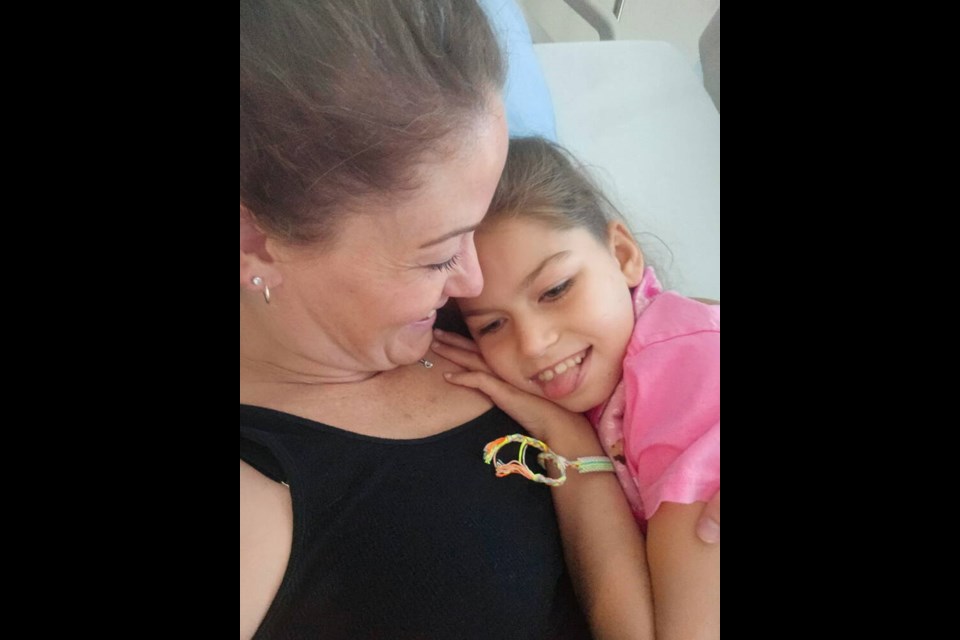B.C. has restored drug coverage for a 10-year-old Langford girl with an ultra-rare terminal disease, ending a six-month saga.
“None of us wishes that it had come to this,” Health Minister Josie Osborne said Friday. “I absolutely regret the way this has played out.”
For six years, Charleigh Pollock visited Victoria General Hospital every two weeks for infusions of a drug to slow the progression of Batten disease (CLN2), a fatal neurodegenerative disorder with a typical life expectancy of 10 to 12 years without treatment. The drug, called Brineura, costs $33,000 per infusion, or about $800,000 a year.
In February, the province said it would cut coverage for the drug for Charleigh, the only child in B.C. who was taking it, based on expert advice that she had met discontinuation criteria.
The move resulted in mounting public pressure to reverse the decision, with international Batten disease experts weighing in to oppose cutting coverage. Online fundraising raised enough money to restart Charleigh’s bi-weekly infusions on Thursday, almost a month after the last publicly funded treatment June 19.
Osborne ended the drama Thursday evening when she phoned the family to say drug coverage will continue “for as long as the treating physician and the family deem it appropriate.” The province has paid for Charleigh’s infusion on Thursday, Osborne said.
Charleigh’s mother, Jori Fales, said in a phone interview Friday that she was feeling profound relief, “and just pure joy and gratitude that this whole nightmare has come to an end.”
The family “has suffered immensely over the last six months,” said Fales, adding that she accepts the minister’s apology and is elated at the outcome.
“At the end of the day, the right decision has been made, our voices have been heard, and Charleigh will continue to get exactly what she needs.”
Fales said she’ll sort out how to use the public donations in the days ahead.
Osborne said the “tipping point” for reversing the decision was the number and range of international physicians and researchers from the U.S.-based Batten Disease Centers of Excellence and U.S. Batten Disease Clinical Research Consortium who wrote to her this week asking that funding be restored. Those behind the letter have cared for the majority of U.S. patients with CLN2 treated with Brineura.
“Charleigh’s family should not have to be caught in the middle of a debate among experts,” said Osborne.
The Batten disease experts also called for a review of the current criteria for discontinuing the drug.
Prior to 2017, the late-infancy form of CLN2 that Charleigh has was “universally fatal” with no treatment available, but Brineura’s enzyme-replacement therapy has “demonstrably prolonged survival, slowed progression, improved seizure control and enhanced quality of life,” the letter said.
The experts said the criteria for stopping the drug, which are based on a patient’s motor and language skills — Charleigh can no longer talk or walk — don’t take into account cognition, feeding, breathing, reduced seizures and hospitalization, or quality of life as assessed by family and the medical care team.
They said that with treatment, children with CLN2 disease with severely limited mobility and language may continue to “meaningfully” interact with their environment and communicate non-verbally for years without the need for nutritional or respiratory support.
The province had made its initial decision against the wishes of Charleigh’s family and treating physician.
Coverage decisions by the province’s Expensive Drugs for Rare Diseases program are based on the advice of independent experts and lay members as part of the Canadian Drug Expert Committee appointed by Canada’s Drug Agency. The program, which was established in 2007, covers about 30 drugs for rare diseases in the province.
Neuroscientist Dr. Ineka Whiteman told the Times Colonist the experts’ letter to Osborne was crafted over a number of days as they were gathered at a conference in Nebraska.
“The timing couldn’t have been better,” said Whiteman. “The depth and breadth of experience this group has collectively is resounding — it just hasn’t been published yet.”
With so few patients with Batten disease — about 15 in Canada and a few hundred worldwide — patient data and scientific evidence take longer to collect, said Whiteman, adding there is compelling evidence to update the clinical and discontinuation criteria for Brineura, first established in 2019.
“It has been a David and Goliath battle, but we knew from the beginning that this was not the right decision from the government, not based on emotion but based on evidence, and our job really was just to communicate that.”
Osborne said the letter from the Batten disease experts confirmed a “significant disagreement between health experts on Brineura.”
The minister said the situation highlights the “urgent need” for stronger, more transparent processes, particularly around Brineura.
She said she has asked the Therapeutics Initiative — an independent research and education organization — to conduct a thorough assessment of Brineura to help guide clinical practice and public policy. Based at the University of B.C., the Therapeutics Initiative aims to provide health professionals with independent, evidence-based information on drug therapies.
Osborne also wants BioMarin Pharmaceuticals, which manufactures Brineura, to compile the most recent data on clinical evidence on the drug’s efficacy and criteria for starting and stopping it.
She called on the federal government to expedite a national strategy for drugs for rare diseases to ensure equitable access and sustainable funding of rare-disease treatments across all provinces and territories.
On Friday afternoon, the Health Ministry confirmed it was aware of about four resignations from the Expensive Drugs for Rare Diseases panel as a result of the minister's decision to restore coverage.



